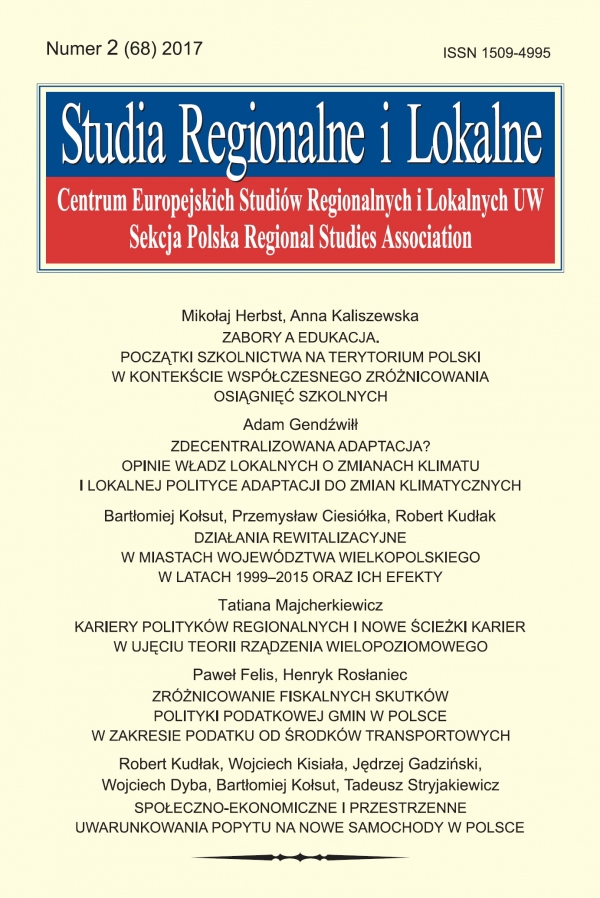Issue:
2(68)/2017
Bartłomiej Kołsut, Przemysław Ciesiółka, Robert Kudłak
Urban regeneration actions in the cities of the Wielkopolska Voivodeship in the 1999–2015 period and their consequences
DOI: 10.7366/150949956803
Działania rewitalizacyjne w miastach województwa wielkopolskiego w latach 1999–2015 oraz ich efekty
Celem artykułu jest identyfikacja i analiza działań rewitalizacyjnych podjętych w miastach województwa wielkopolskiego w latach 1999–2015 oraz ich bezpośrednich i pośrednich efektów. W ramach realizacji tego celu przeanalizowane zostały lokalne programy rewitalizacji oraz dokumenty strategiczne badanych miast, przeprowadzono badanie ankietowe wśród działaczy samorządów lokalnych oraz wywiady pogłębione z innymi aktorami procesu rewitalizacji. W świetle tego badania można stwierdzić, że działania rewitalizacyjne podejmowane w miastach województwa wielkopolskiego nie są zintegrowane, tzn. nie mają charakteru kompleksowego i komplementarnego (nie uzupełniają się nawzajem tematycznie na danym obszarze). Projekty infrastrukturalne dominują nad społecznymi i gospodarczymi. Społeczne i gospodarcze efekty działań rewitalizacyjnych są niemal nieznane. Znacznie lepiej widoczne są efekty techniczno-budowlane. Przeprowadzone badanie pozwoliło również zidentyfikować pewne nieoczekiwane, zarówno pozytywne, jak i negatywne, efekty rewitalizacji, takie jak wzrost zaangażowania lokalnych stowarzyszeń, właścicieli nieruchomości i przedsiębiorców w działania rewitalizacyjne oraz problem działań spekulacyjnych na terenach rewitalizowanych.
Urban regeneration actions in the cities of the Wielkopolska Voivodeship in the 1999–2015 period and their consequences
The article attempts to identify and analyze the actions undertaken in the cities of the Wielkopolska Voivodeship in the area of urban renewal in the 1999–2005 period as well as the direct and indirect effects of these actions. In order to reach this objective, we analyze the local renewal programmes as well as other strategic documents launched in the investigated cities. In addition, we employ the survey technique and conduct numerous in-depth interviews with the local actors of the renewal process in order to get better insights into the economic, societal and spatial context of the renewal process. As a result, we show that the actions undertaken by the cities of the Wielkopolska Voivodeship in the realm of urban renewal are hardly integrated (they are not comprehensive and do not complement each other in a given area) and dominated by infrastructural investments. In contrast, the economic and social projects remain rare and their consequences ambiguous. We also identify some unexpected, positive as well as negative, consequences of the renewal process, such as increasing engagement of local property owners, entrepreneurs and associations in the renewal actions as well as the problem of profiteering on the renewed areas.
Affiliation:
Bartłomiej Kołsut: Uniwersytet im. Adama Mickiewicza w Poznaniu, Instytut Geografii Społeczno-Ekonomicznej i Gospodarki Przestrzennej, ul. Bogumiła Krygowskiego 10, 61-680 Poznań;
bartkol@amu.edu.pl Przemysław Ciesiółka: Uniwersytet im. Adama Mickiewicza w Poznaniu, Instytut Geografii Społeczno-Ekonomicznej i Gospodarki Przestrzennej, ul. Bogumiła Krygowskiego 10, 61-680 Poznań;
przemko@amu.edu.pl Robert Kudłak: Uniwersytet im. Adama Mickiewicza w Poznaniu, Instytut Geografii Społeczno-Ekonomicznej i Gospodarki Przestrzennej, ul. Bogumiła Krygowskiego 10, 61-680 Poznań;
rkudlak@amu.edu.pl 


